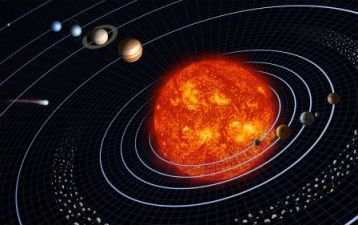Gravity
What is gravity?
Gravity is the mysterious force that makes everything fall down towards the Earth. But what is it?
It turns out that all objects have gravity. It's just that some objects, like the Earth and the Sun, have a lot more gravity than others.
How much gravity an object has depends on how big it is. To be specific, how much mass it has. It also depends on how close you are to the object. The closer you are, the stronger the gravity.
Why is gravity important?
Gravity is very important to our everyday lives. Without Earth's gravity we would fly right off it. We'd all have to be strapped down. If you kicked a ball, it would fly off forever. While it might be fun to try for a few minutes, we certainly couldn't live without gravity.

Gravity also is important on a larger scale. It is the Sun's gravity that keeps the Earth in orbit around the Sun. Life on Earth needs the Sun's light and warmth to survive. Gravity helps the Earth to stay just the right distance from the Sun, so it's not too hot or too cold.
Who discovered gravity?
The first person who dropped something heavy on their toe knew something was going on, but gravity was first mathematically described by the scientist Isaac Newton. His theory is called Newton's law of universal gravitation. Later, Albert Einstein would make some improvements on this theory in his theory of relativity.
What is weight?
Weight is the force of gravity on an object. Our weight on Earth is how much force the Earth's gravity has on us and how hard it is pulling us toward the surface.
Do objects fall at the same speed?
Yes, this is called the equivalence principle. Objects of different masses will fall to the Earth at the same speed. If you take two balls of different masses to the top of a building and drop them, they will hit the ground at the same time. There is actually a specific acceleration that all objects fall at called a standard gravity, or "g". It equals 9.807 meters per second squared (m/s2).
Fun facts about gravity
What is gravity?
Gravity is the mysterious force that makes everything fall down towards the Earth. But what is it?
It turns out that all objects have gravity. It's just that some objects, like the Earth and the Sun, have a lot more gravity than others.
How much gravity an object has depends on how big it is. To be specific, how much mass it has. It also depends on how close you are to the object. The closer you are, the stronger the gravity.
Why is gravity important?
Gravity is very important to our everyday lives. Without Earth's gravity we would fly right off it. We'd all have to be strapped down. If you kicked a ball, it would fly off forever. While it might be fun to try for a few minutes, we certainly couldn't live without gravity.

Gravity also is important on a larger scale. It is the Sun's gravity that keeps the Earth in orbit around the Sun. Life on Earth needs the Sun's light and warmth to survive. Gravity helps the Earth to stay just the right distance from the Sun, so it's not too hot or too cold.
Who discovered gravity?
The first person who dropped something heavy on their toe knew something was going on, but gravity was first mathematically described by the scientist Isaac Newton. His theory is called Newton's law of universal gravitation. Later, Albert Einstein would make some improvements on this theory in his theory of relativity.
Weight is the force of gravity on an object. Our weight on Earth is how much force the Earth's gravity has on us and how hard it is pulling us toward the surface.
Do objects fall at the same speed?
Yes, this is called the equivalence principle. Objects of different masses will fall to the Earth at the same speed. If you take two balls of different masses to the top of a building and drop them, they will hit the ground at the same time. There is actually a specific acceleration that all objects fall at called a standard gravity, or "g". It equals 9.807 meters per second squared (m/s2).
Fun facts about gravity
- Ocean tides are caused by the gravity of the moon.
- Mars is smaller and has less mass than Earth. As a result it has less gravity. If you weigh 100 pounds on Earth, you would weigh 38 pounds on Mars.
- The standard gravity from Earth is 1 g force. When riding a roller coaster you may feel a lot more g forces at times. Maybe as much as 4 or 5 g's. Fighter pilots or astronauts may feel even more.
- At some point when falling, the friction from the air will equal the force of gravity and the object will be at a constant speed. This is called the terminal velocity. For a sky diver this speed is around 122 miles per hour!
Комментариев нет:
Отправить комментарий